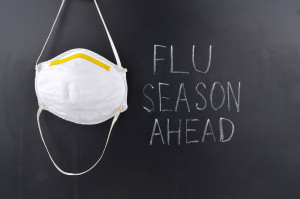 Columbine Family Practice is hosting a flu clinic on the following days:
Columbine Family Practice is hosting a flu clinic on the following days:
— Saturday, September 27th from 8 AM – 3 PM
— Friday, October 4th from 8 AM – 12 PM
What sort of flu season is expected this year?
It’s not possible to predict what this flu season will be like. Flu seasons are unpredictable in a number of ways. While flu spreads every year, the timing, severity, and length of the season usually varies from one season to another.
Will new flu viruses circulate this season?
Flu viruses are constantly changing so it’s not unusual for new flu viruses to appear each year. For more information about how flu viruses change, visit How the Flu Virus Can Change.
When will flu activity begin and when will it peak?
The timing of flu is very unpredictable and can vary from season to season. Flu activity most commonly peaks in the U.S. between December and February. However, seasonal flu activity can begin as early as October and continue to occur as late as May.
What should I do to prepare for this flu season?
CDC recommends a yearly flu vaccine for everyone 6 months of age and older as the first and most important step in protecting against this serious disease. While there are many different flu viruses, the seasonal flu vaccine is designed to protect against the main flu viruses that research suggests will cause the most illness during the upcoming flu season. People should begin getting vaccinated soon after flu vaccine becomes available, ideally by October, to ensure that as many people as possible are protected before flu season begins.
In addition to getting vaccinated, you can take everyday preventive actions like staying away from sick people and washing your hands to reduce the spread of germs. If you are sick with flu, stay home from work or school to prevent spreading flu to others.
What should I do to protect my loved ones from flu this season?
Encourage your loved ones to get vaccinated as soon as vaccine becomes available in their communities, preferably by October. Vaccination is especially important for people at high risk for serious flu complications, and their close contacts.
Children between 6 months and 8 years of age may need two doses of flu vaccine to be fully protected from flu. Your child’s doctor or other health care professional can tell you whether your child needs two doses. Visit Children, the Flu, and the Flu Vaccine for more information.
Children younger than 6 months are at higher risk of serious flu complications, but are too young to get a flu vaccine. Because of this, safeguarding them from flu is especially important. If you live with or care for an infant younger than 6 months of age, you should get a flu vaccine to help protect them from flu. See Advice for Caregivers of Young Children for more information.
In addition to getting vaccinated, you and your loved ones can take everyday preventive actions like staying away from sick people and washing your hands to reduce the spread of germs. If you are sick with flu, stay home from work or school to prevent spreading influenza to others.
 When should I get vaccinated?
When should I get vaccinated?
CDC recommends that people get vaccinated against flu soon after vaccine becomes available, preferably by October.
It takes about two weeks after vaccination for antibodies to develop in the body and provide protection against the flu.
Doctors and nurses are encouraged to begin vaccinating their patients soon after vaccine becomes available, preferably by October so as not to miss out on opportunities to vaccinate. Those children 6 months through 8 years of age who need two doses of vaccine should receive the first dose as soon as possible to allow time to get the second dose before the start of flu season. The two doses should be given at least 4 weeks apart.
Source: www.cdc.gov; 2014.






